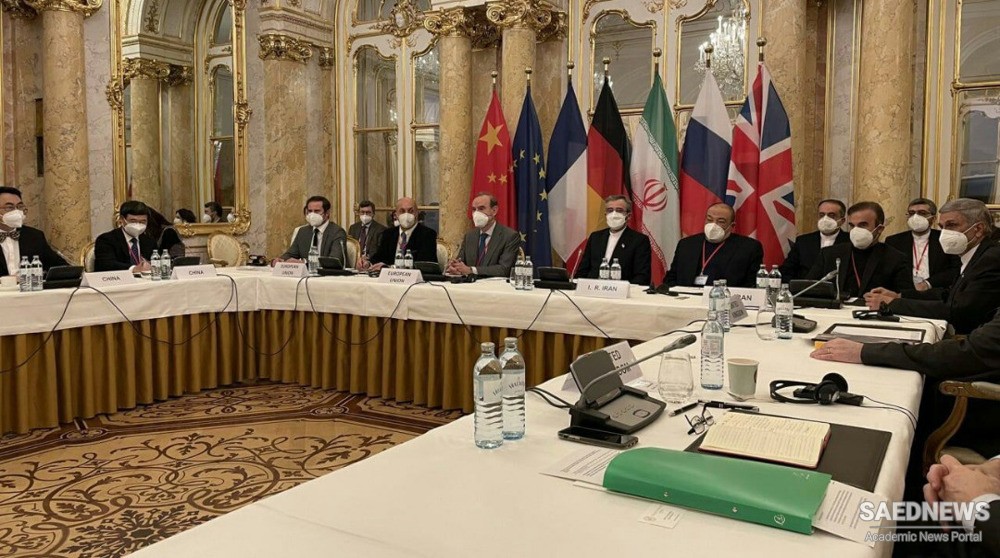Vienna, SAEDNEWS: Amir-Abdollahian made the remarks in a Monday article, noting that the remaining parties to the nuclear deal, officially known as the Joint Comprehensive Plan of Action (JCPOA), are starting a new round of talks in Vienna after “six rounds of intensive negotiations in Vienna did not lead to success due to the US excessive demands and unrealistic stances.”
“The main goal of these negotiations is the restoration of the rights of the Iranian nation and removal of all the sanctions imposed unilaterally and extraterritorially on Iran by the United States, which is no longer a party to the JCPOA,” Iran’s top diplomat added.
Pointing to the unilateral withdrawal of the US administration, under former President Donald Trump, form the landmark agreement in 2018, Amir-Abdollahian said, “There is international consensus that these unlawful US behaviors demonstrate a total contempt for the international law and the UN Charter, undermine multilateralism, and pose enormous menace to international peace and security.”
The top Iranian diplomat also censured the incumbent occupant of the White House for reneging on his campaign promises about not following anti-Iran policies of Trump, saying, “Despite the formation of a new government in the United States, not only have the illegal and unilateral sanctions remained in place, but the policy of imposing sanctions on Iran has continued to exist.”
Amir-Abdollahian blasted the United States as the “main culprit behind the creation of the status quo,” stressing that, “In the past four years, the government of the United States has spared no effort to crush the nuclear deal, and it was Iran that did all it could to keep the deal alive.”
The Iranian foreign minister said the Islamic Republic, in spite of significant non-performance by the West in the JCPOA, is once again ready, in good faith, for result-oriented negotiations to achieve a “good deal” with the remaining parties to the landmark accord.
“The main objective of the upcoming talks should be the full and effective implementation of the JCPOA and the pursuit of the goal of normalization of trade relations and economic cooperation with Iran,” he underlined in the article.
“It goes without saying that in order to return to the JCPOA, Iran should benefit fully from the lifting of all the sanctions. Iran is prepared to cease application of all its remedial measures if guarantees are provided, damages are assessed, and all sanctions are effectively and verifiably lifted.”
Iran's top diplomat noted that the likely return of the US to the nuclear deal would not be meaningful "unless guarantees are presented to prevent the recurrence of the bitter experience of the past and Iran’s trade partners could confidently enter into long term economic engagement with Iran free from any concern."
"What is clear in the forthcoming negotiations is that Iran will not accept requests beyond the JCPOA. The Islamic Republic of Iran will not enter into any discussion whatsoever about issues beyond the nuclear deal."
Amir-Abdollahian stated that the new round of talks in Vienna provide an opportunity for all parties to end the current deadlock over the nuclear deal, saying, "I would like to emphasize once again that this opportunity is not a window that could remain open forever and the US and the three European countries must well understand this."
"Deal is possible if other parties demonstrate political will in practice," Iran's top diplomat emphasized.
"Despite the unfulfilled promises of the West and distrust towards the unconstructive approach and policies of the White House, the Islamic Republic of Iran will endeavor 'with true determination' and 'in good faith' in Vienna negotiations to achieve a 'good', sustainable and effective verifiable deal for the lifting of sanctions," he concluded.
Envoys from Iran and the remaining signatories to the JCPOA – Britain, France, Germany, Russia and China – are in Vienna for the seventh round of discussions. The negotiations were paused in June, when Iran held its presidential election. Since then, the new Iranian administration has been reviewing the details of the six rounds of discussions held under the previous administration.
Iran has already clarified that the talks will not focus on nuclear issues, noting that those issues were already been resolved through negotiations, which led to the conclusion of the JCPOA.
Trump left the JCPOA in May 2018 and reimposed the anti-Iran sanctions that the deal had lifted. He also placed additional sanctions on Iran under other pretexts not related to the nuclear case as part of his “maximum pressure” campaign.
Following a year of strategic patience, Iran resorted to its legal rights under the JCPOA, which grants a party the right to suspend its contractual commitments in case of non-compliance by other signatories and let go of some of the restrictions imposed on its nuclear energy program.
The US administration of Joe Biden had said it is willing to undo Trump’s wrongs and rejoin the landmark deal, but it has retained the sanctions as leverage.
Tehran insists that all sanctions must first be removed in a verifiable manner before the Islamic Republic reverses its remedial measures (Source: PRESSTV).


 Iran’s foreign minister says attempt on Kadhimi’s life aimed at disturbing peace in Iraq
Iran’s foreign minister says attempt on Kadhimi’s life aimed at disturbing peace in Iraq














































